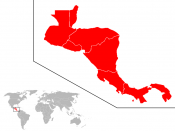Nicaragua, republic and largest nation in Central America. Called "the land of lakes and volcanoes," Nicaragua contains regions of thick rain forests, rugged highlands, and fertile farming areas. The largest lakes in Central America and a chain of volcanic peaks dominate its western heartland, the center of its population and economy. Severe earthquakes have destroyed Managua, its capital and largest city, twice in the 20th century.
With a population of more than 4.2 million, Nicaragua is the least densely populated country in Central America, and also the most urban. Its people are mostly mestizos, of mixed European and Native American descent, but include ethnic minorities of Native American, African, and European background. Nicaragua's economy is based largely on agriculture, especially on crops grown for export. Coffee is the most important of these products, while corn is the major crop grown for domestic consumption. In the 1990s Nicaragua was the poorest nation in Central America, after suffering from years of corrupt dictatorships, natural disasters, revolution, and civil war.
Internal conflicts and intervention by other nations, especially the United States, have shaped much of Nicaragua's history. Its indigenous people were mostly killed or enslaved after the Spanish conquest of the area in the early 1500s. Nicaragua remained a minor part of the Spanish colonial empire until Central America gained independence in 1821. Disputes and warfare between Liberal and Conservative factions were constant during the country's first century, and armed U.S. forces intervened several times: in the 1850s, when an American mercenary took over Nicaragua, and between 1912 and 1933, when U.S. Marines were stationed there to impose order.
For more than 40 years, Nicaragua's government and economy were controlled by the Somoza family dictatorship, which enriched itself and its supporters at the nation's expense. The Somozas, who enjoyed strong U.S. support, were...


